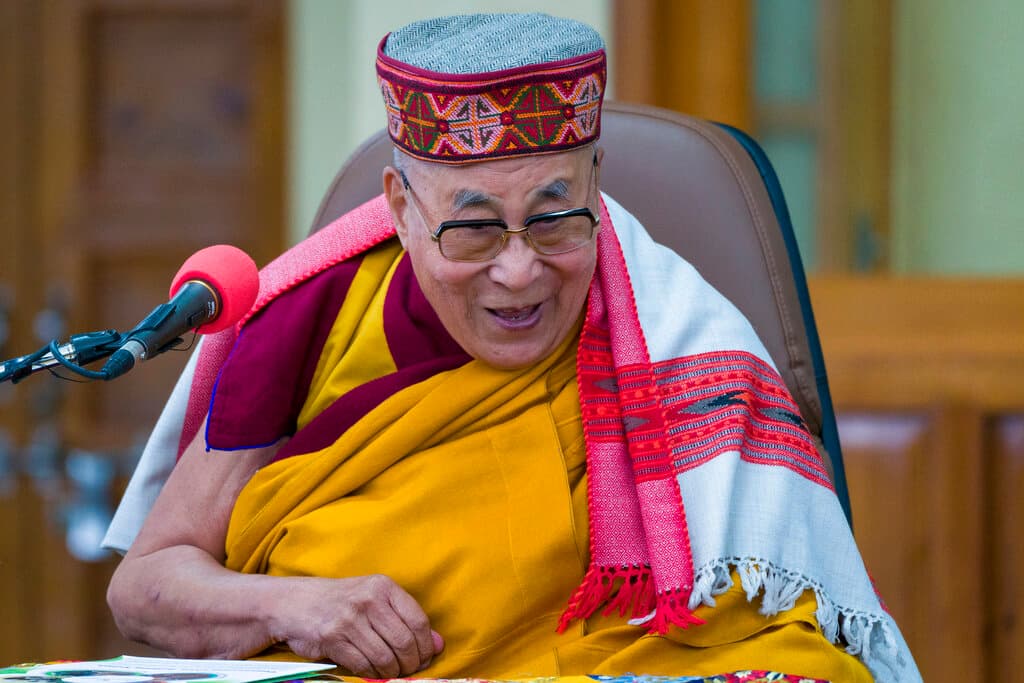Dalai Lama Apologizes for Invitation for Boy To Suck His Holiness’s Tongue
The request by the Tibetan spiritual leader struck many observers as over the top.

There it was on screen in living color: The Dalai Lama, garbed in orange robe, projecting the image of a benevolent grandfather, asking a young Indian boy, “And suck my tongue.”
It was one thing for His Holiness, Buddhist monk and leader of millions in all religions, respected and beloved worldwide, to ask the boy as he approached the dais where his Holiness sat in in spiritual splendor to hug and and then to give him a hug in return. The boy, after all, had initiated the exchange, asking the Dalai Lama, “Can I hug you?”
The scene, before aides and worshippers at the Dalai Lama’s abode in the northern India hill town of Dharamshala, got a little cloying when the Dalai Lama kissed the boy smack on the lips, but the request to suck the Dalai Lama’s tongue struck many observers as over the top.
“The boy quickly stuck out his own tongue and went to move away,” in the Guardian’s description of the interaction, “while the Dalai Lama laughed and pulled the boy in for another hug, as the audience laughed.”
The 87-year-old Dalai Lama seemed utterly genial and composed as he bade farewell to the boy. Could it be that such a gesture is acceptable in the Dalai Lama’s native Tibet? “In most countries sticking out your tongue would be considered a bit rude,” the BBC has reported, “but in Tibet it’s a way of greeting.”
The BBC traces the “traditional greeting” to the 9th century, “the time of an unpopular king called Lang Darma, who was known for his black tongue.” Tibetans feared “the king had been reborn,” the BBC reports, “so to prove they weren’t the king, they would show their tongues.” The custom is “now a form of respect,” the BBC says.
Maybe, but Twitter users didn’t seem to think so. The response on the social media platform was anything but calm, much less understanding.
A user named Sangita reflected the prevailing view of the scene, captured worldwide by BBC, CNN, and others. “Utterly shocked to see this display,” said Sangita. “What did I just see,” asked Rakhi Tripathi. “Disgusting.”
The fact that the scene was broadcast worldwide compelled the office of the Dalai Lama, who has lived in exile from his native Tibet since 1959, to issue a statement that was sort of an apology and sort of an excuse.
No, His Holiness did not apologize exactly for kissing the boy and then asking for what looked like more than a kiss in return. Rather, said the statement on Twitter, His Holiness “wishes to apologize to the boy and his family” for “the hurt his words may have caused.”
Nothing about what might generally be seen as a highly sensual interaction. Please understand, the statement begged, “His Holiness often teases the people he meets in an innocent and playful way, even in public before cameras.” Nothing about what might generally be seen as a highly sensual interaction.
The statement concluded, “He regrets the incident,” but what the Dalai Lama and his staff really seemed to regret was that the world had witnessed a gesture that seemed, well, inappropriate.
China’s communist regime, however, had to have been happy. The Dalai Lama has been depicted by Beijing as a hostile figure ever since the Chinese annexed Tibet in 1951. He fled into exile eight years later after the Chinese put down a rebellion by Tibetans.
The Dalai Lama is still feared by China’s leaders for the reverence with which he’s viewed in his native land and around the world. To China he’s “a violent separatist” though he commands no troops and has never supported an armed uprising against the regime.

